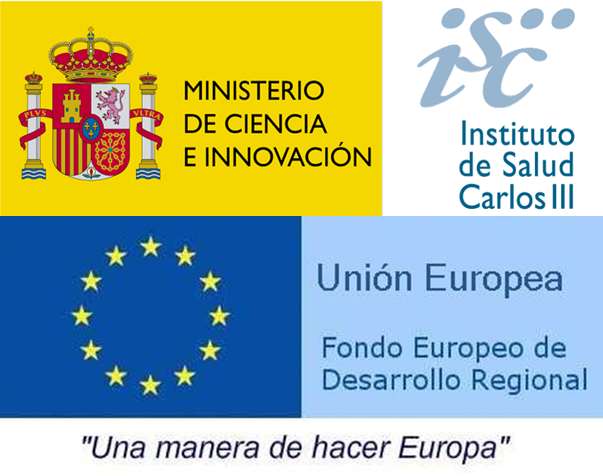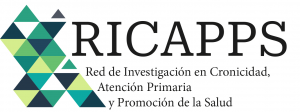Name: RICAPPS
Full name: Research Network on Chronicity, Primary Care and Prevention and Health Promotion (In Spanish: Red de Investigación en Cronicidad, Atención Primaria y Prevención y Promoción de la Salud) 
Financing entity: Carlos III Health Institute, European Regional Development Fund (ERDF), and European Social Fund+
Official website: https://www.ricapps.es/
Mission:
To promote networked research oriented towards health outcomes in Primary Care, chronicity, and health promotion, in order to transfer the results to clinical practice and health service organizations, and thus ensure the improvement of health care to the population. The mission is aligned with the objectives of the Health, Demographic Change, and Well-being Challenge of the Spanish Strategy for Science, Technology and Innovation, and with the European Union’s Horizon Europe framework.
Description:
RICAPPS is composed of 26 research groups with a previous experience of at least 10 years in cooperative research. The groups are characterised by their multidisciplinarity, their scientific strength and their work in different lines of research that complement each other.
The network is focused on collaboration centred on the development of projects that address the research needs of the National Health System (NHS), and on the prioritisation of achieving results aimed at improving the quality of care in Primary Care, the health of the population and its translation to the real world. The projects developed in the network will be targeted different agents and/or audiences: patients, families, carers, primary care professionals, professionals involved in the continuity of care and policymakers.
One of the added values of RICAPPS is the close relationship of the research groups with the Primary Care centres and professionals. In addition, the diversity of institutions supporting these research groups, such as health administrations, research units, primary care and hospital services, universities and national research institutes, broadens the perspective of the analyses and offers the possibility to improve both the selection of research topics and the transfer of research products. This transfer is facilitated by the incorporation in RICAPPS of a large number of researchers in multidisciplinary clinical care groups in different regions. The synergies, together with the broad representation of several Spanish regions, will reinforce the development of a comprehensive research programme that will provide research responses to all the needs of the agents of the Spanish NHS.
Network aims:
- To characterise, evaluate and analyse the impact of health promotion and primary prevention strategies with a gender perspective in primary care and community settings.
- To improve the screening, detection, diagnosis and management of the most relevant non-communicable diseases in Primary Care.
- To characterise, compare interventions and evaluate the care of patients with chronic diseases and multimorbidity in Primary Care and in the processes of continuity of care.
- To promote innovative and responsible research, centred on the person and on care needs, which incorporates the gender perspective and which makes its implementation in Primary Care sustainable.
- To develop and evaluate patient-centred strategies and interventions, digital health solutions and quantitative and qualitative methodological improvements for health services research.
The network:
RICAPPS is composed the research groups coming from two previous networks: the Research Network on Health Services in Chronic Diseases (Red de Investigación en Servicios de Salud en Enfermedades Crónicas, REDISSEC) and the Research Network on Preventive Activities and Health Promotion.
The network is composed of 26 research groups from 12 Spanish regions (representing 90.2% of the Spanish population), and 9 Associated Clinical support groups from 9 Spanish regions.
Basque groups:
Biosistemak Institute coordinates two projects within the network. These projects have obtained a grant from the RICORS sub-programme (Research Networks oriented towards Health Results), within the Strategic Action in Health 2021.
GROUP RD21/0016/001
– Principal Investigator: Susana García Gutiérrez.
– Organisation: OSI Barrualde-Galdakao.
– Role: Scientific coordination of work package 14
– Title: “Development of methodologies for health services research”.
– Description of the group:
This group is composed of the Integrated Health Organisation (IHO) Barrualde-Galdakao Research Unit (UIOBG), together with clinical researchers from the IHO itself, in addition to professionals from the University of the Basque Country (UPV-EHU), the Basque Centre for Applied Mathematics (BCAM) and Biosistemak Institute for Health System Research.
Professionals with different profiles participate in the group: physicians/epidemiologists with epidemiological and statistical training, knowledge of the clinical environment/care experience; care staff (medical and nursing) researching in the field of ISS; mathematicians with expertise in biostatistics, data analysis, big data, economic evaluation and innovation; staff with expertise in quantitative and qualitative methodology, as well as in the coordination of research activities; project managers, responsible for administrative tasks and the planning, development and editing of project data; engineers with expertise in statistics, data analysis, large databases, and innovation; and staff with expertise in the creation, management, quality control and maintenance of research-related databases and in the coordination of research projects and clinical trials.
The main research lines of the group are the evaluation of healthcare, as part of health services research.
GROUP RD21/0016/0011
– Principal Investigator: Amaia Bilbao González.
– Organisation: OSI Bilbao-Basurto.
– Role: Scientific coordination of work package 14, entitled: “Development of methodologies for health services research”.
– Description of the group:
A multidisciplinary team made up of 14 professionals with complementary profiles, covering the field of clinical practice in primary care, epidemiology, biostatistics, and health management. The group is coordinated by the Bilbao-Basurto Integrated Health Organisation, and researchers from IIS Bioaraba, IIS Biogipuzkoa, IIS Biosistemak, Osakidetza General Directorate, and the University of Deusto also belong to it.
The group has extensive experience in health services research focused on chronic diseases, evaluation of patient-perceived outcomes and experiences (PROMs and PREMs), mathematical modeling, development, and validation of predictive models, risk stratification, economic evaluation and the use of real-world data (Real World Data, RWD). In addition, the group has extensive experience in the evaluation of health services, the design and evaluation of new interventions, and their implementation and evaluation.

